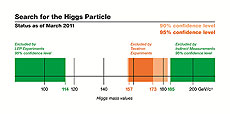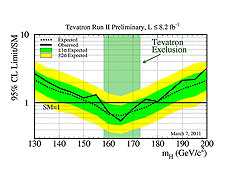Tevatron experiments report new Higgs search results
 |
Improved analysis techniques and more data have made the Tevatron experiments more sensitive to the Higgs boson. CDF and DZero exclude a significant portion of the high-Higgs-mass range. |
The CDF and DZero experiments at Fermilab have reached new ground in their quest to find the Higgs boson, a key member of the particle zoo known as the Standard Model. For the first time, each experiment by itself excludes regions of the expected Higgs mass range as more sophisticated data analysis techniques and more data from the Tevatron particle collider have increased their sensitivity to the Higgs boson. This week, the two collaborations, each comprising about 500 scientists, will present details of their results at conferences and seminars around the world, including the Rencontres de Moriond in Italy.
“This makes the Tevatron the frontrunner in the hunt for the Standard Model Higgs boson,” said Fermilab physicist Rob Roser, co-spokesperson for the CDF experiment. “We are getting more mileage out of 10 years worth of Tevatron Run II data.”
The Tevatron, four miles in circumference, is the world’s highest-energy proton-antiproton collider.
"It is impressive to see the progress in the analysis of the Tevatron data from CDF and DZero,” said Fermilab Director Pier Oddone. “Step by step they are narrowing the space in which the Higgs could be hiding."
Searches by previous experiments and constraints due to precision measurements of the Standard Model of Particles and Forces indicate that the Higgs particle should have a mass between 114 and 185 GeV/c2. (For comparison: 100 GeV/c2 is equivalent to 107 times the mass of a proton.) The CDF and DZero experiments are now sensitive to excluding Higgs bosons with masses from 153 to 179 GeV/c2. Statistical fluctuations in the number of observed particle collisions that mimic a Higgs signal, mixed with collisions that may have produced a Higgs boson, affect the actual range that can be excluded with 95 percent certainty. Combining their independent Higgs analyses, the two experiments now exclude a Higgs boson with a mass between 158 and 173 GeV/c2. The recording of additional collisions and further improved analysis of data will reduce the size of the statistical fluctuations and, over time, could reveal a signal from the Higgs boson.
“Fermilab plans to operate the Tevatron collider until September 2011,” said DZero co-spokesperson Stefan Söldner-Rembold, of the University of Manchester. “During this time, we will increase what is already the largest data set from a hadron collider at the Energy Frontier.”
Read more
-- Kurt Riesselmann
 |
Combined the Tevatron experiments now are sensitive to a Higgs mass from 153 to 179 GeV/c2, but statistical fluctuation reduce the actual mass range that can be excluded so far. For the first time, the experiments now also exclude Higgs mass ranges individually (see CDF and DZero graphics). |
|